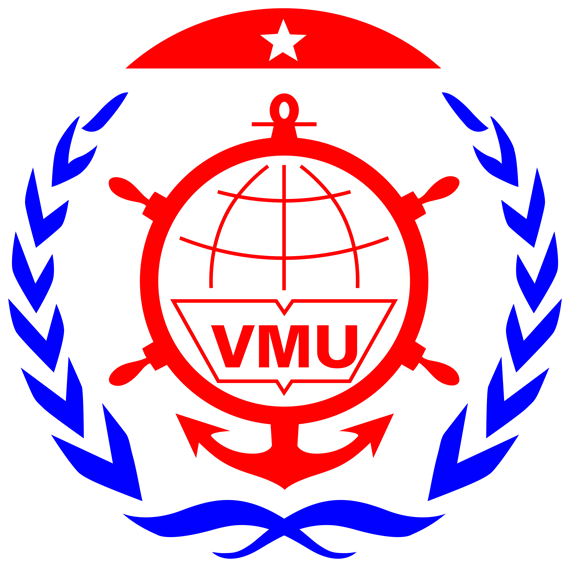1. Introduction
|
Program title: |
Bachelor of Maritime Management |
|
Graduation degree: |
Bachelor's degree |
|
Study model: |
Full-time |
|
Total credits: |
135 |
|
Used language: |
Vietnamese |
|
Training duration: |
4 years (8 semesters) |
|
Responsible Faculty: |
Faculty of Navigation |
|
Website: |
|
|
Address: |
Room 211, 2nd floor A2 Building, Vietnam Maritime University 484 Lach Tray - Le Chan - Hai Phong |
The Maritime Management training program at Vietnam Maritime University, designed by the Faculty of Navigation, draws upon programs from various esteemed domestic and international universities such as Dalian Maritime University, Shanghai Maritime University, Korea Maritime and Ocean University, Mokpo National Maritime University, University of Transport and Communications, and Ho Chi Minh City University of Transport. Regularly updated to align with industry needs and adhere to the Ministry of Education & Training and Vietnam Maritime University regulations, the program equips learners with essential knowledge, skills, and attitudes. It meets the Vietnamese National Qualifications Framework and international standards, preparing graduates to excel in the 21st-century workforce.
The objective of the program is to train bachelor's degree graduates in Maritime Management. Graduates of this program will be capable of implementing and executing maritime management processes, demonstrating dynamism, creativity, and adaptability to various work environments. They will also possess the competitiveness to match the human resources in the Asia-Pacific region, contributing to the development of the maritime economy, national construction and defense, and international integration.
Graduates will meet the demands of society in various state agencies and organizations such as Port Administration Management, Maritime Safety Management, Port Operations Management, Environmental Management in Maritime Activities. Marine Transportation Operations Management, Offshore Facility Management for Oil & Gas and Marine Resource Exploration, Warehouse and Terminal Logistics Management, Marine Insurance Business, Maritime Agency and Brokerage, Maritime Inspection and Surveying, Customs Operations at Seaports, Maritime Inspection and Regulation Enforcement…
The Bachelor of Maritime Management program at Vietnam Maritime University provides students with a strong foundation to advance into leadership roles, become maritime experts, and pursue further studies in Master’s and Doctoral programs in Maritime Management, Public Administration, Maritime Planning, and other related fields.
2. Curriculum
The Bachelor’s Program in Maritime Management is designed to equip students with both foundational and advanced knowledge in maritime science, management, law, and operations. The curriculum is structured across eight semesters, combining theoretical learning with practical applications to prepare graduates for careers in the maritime industry.
In Semester I, students are introduced to fundamental subjects such as Introduction to Laws, Physics 2, Algebra, Introduction to Navigation Science, Science of Maritime Management, and Corporate Governance. These courses lay the groundwork for understanding maritime regulations, scientific principles, and management structures. Students can also choose elective courses like Environment and Protection of the Environment or Soft Skills 1 to enhance their environmental awareness and communication abilities.
During Semester II, students further develop their analytical and technical skills through Philosophy of Marxism and Leninism, Technical Drawing, Analysis, Probability and Statistics, Maritime Geography, and Ship Knowledge. These subjects provide insights into maritime routes, vessel structures, and mathematical principles essential for maritime operations. Elective options include Basic English 1 for language proficiency or Office Information for digital literacy.
In Semester III, students focus on maritime-specific disciplines, including Maritime Safe Working Practices Management, Basic Maritime Geography, Marine Environment Protection, Logistics and Supply Chain Overview, Maritime Meteorology and Oceanography, and Political Economy of Marxism and Leninism. These courses cover essential aspects of safety regulations, environmental sustainability, and maritime economics. Elective courses such as Basic English 2 and Marine Engineering allow students to refine their communication skills or gain introductory knowledge in ship engineering.
Semester IV introduces advanced maritime topics such as Scientific Socialism, Basic English 3, Maritime Instruments, Ship Stability, Maritime Communication, and Maritime Human Resource Management. These subjects develop students’ understanding of vessel stability, communication protocols, and workforce management in maritime organizations. Elective choices include Law of the Maritime Services and Corporate Culture, which explore legal frameworks and organizational values in maritime enterprises.
By Semester V, students engage with key maritime legal and operational courses, including Ho Chi Minh’s Ideology, Maritime Law, Law of the Sea, International Law on Maritime Safety, Ship Agency and Broker Operation, and Shipping Operations. This semester also includes a Basic Internship Module, providing practical exposure to the maritime industry. Elective courses such as Policy on the Seas and Oceans and Maritime English further enhance students’ understanding of international maritime policies and language proficiency.
In Semester VI, students deepen their knowledge in maritime governance and risk management through History of the Vietnamese Communist Party, State Administration of Maritime, Marine Insurance, Marine Risk Management, Maritime Safety and Security Management, and Maritime Assessment Operation. These courses equip students with essential skills for regulatory compliance, safety protocols, and risk analysis. Elective subjects include Soft Skills 2, International Legislation of Maritime Cargo Transport, and Maritime Energy Efficiency Management, offering students additional expertise in professional development, global shipping regulations, and sustainability practices.
Semester VII focuses on operational aspects of maritime management, including Cargo Handling, Maritime Traffic Management System, Offshore Construction Technology and Operation, Maritime Inspection Operation, and Maritime Search and Rescue. These courses prepare students for handling cargo logistics, vessel inspections, and emergency response operations. Elective options such as Advanced Maritime Management, Passage Planning, and Maritime Information Management allow students to specialize further in strategic management, route planning, and digital information systems.
Finally, in Semester VII, students consolidate their knowledge through practical applications. The Internship Module for Graduation provides hands-on experience in the maritime industry, while the Thesis for Graduation allows students to conduct research and apply their academic learnings to real-world maritime challenges.
This structured eight-semester program ensures that graduates possess the necessary theoretical knowledge, practical skills, and professional competencies to excel in maritime operations, shipping management, logistics, maritime law, safety, and environmental protection.
